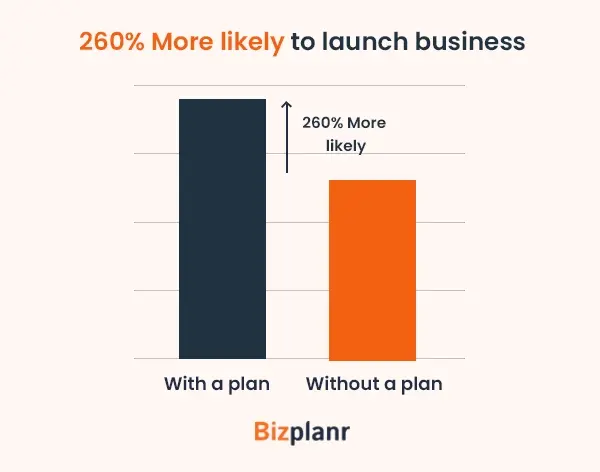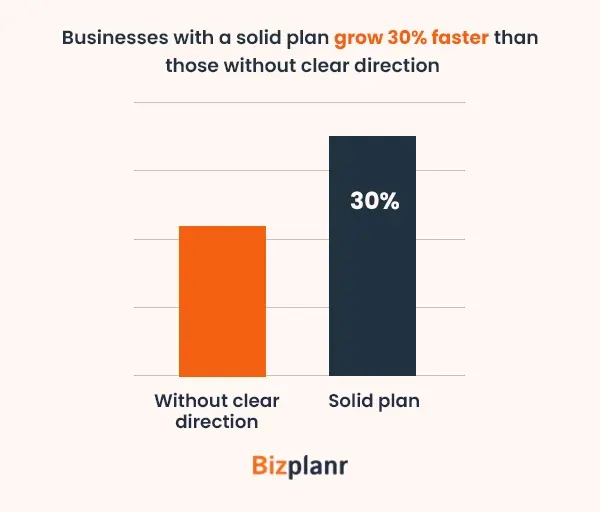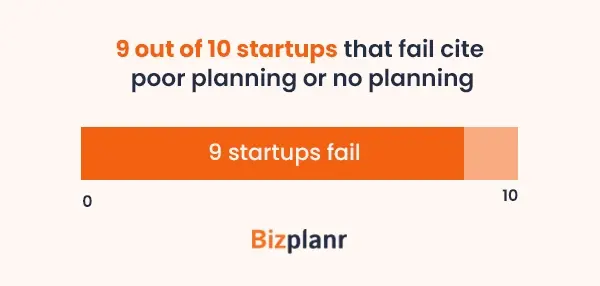Ever wonder why some businesses thrive while others disappear without a trace? It’s rarely about luck, and often about planning. Behind every successful business, there’s a carefully crafted plan guiding decisions, securing funding, and keeping the business on track when challenges hit.
Numbers don’t lie, and today’s business plan statistics prove just how important having a clear strategy is in a competitive market.
In this article, we’ll uncover some eye-opening business plan statistics you probably haven’t seen yet, numbers that highlight why planning matters more than ever in an AI-powered world.
Let’s dive in and see what the data says.
Key Takeaways
- Business plans drive results; companies with a business plan grow 30% faster and are 2.5x more likely to secure funding.
- Strong financial forecasts, market analysis, and clear goals boost a plan’s funding and operational success—75% of investors won’t consider a proposal without them.
- 90% of failed startups blame poor or no planning, unrealistic expectations, or outdated strategies.
- In this blog, you'll explore AI’s role in modern business planning, alarming business exit stats, and a roundup of the best business planning software for smarter, data-driven decisions.
Why business plans matter: Key statistics
Some entrepreneurs believe a great idea is enough to succeed. But statistics paint a different picture. From higher survival rates to better funding odds, businesses with well-crafted plans consistently outperform those without.
According to one survey, they are 260% more likely to launch their business than those without a plan. A clear plan identifies risks and roadblocks before launch; hence, a perfect business plan matters.
Here are a few more stats highlighting the importance of a business plan:
| Aspect | Statistic |
|---|---|
| Faster business growth | 30% faster growth with a formal plan |
| Better chances of securing investment | 133% more capital raised by businesses with a plan |
| Higher sales performance | 30% higher sales growth in companies with documented strategies |
| Improved long-term survival | 70% of 5+ year-old companies credit their business strategy |
| Better investor interest | 69% of venture capitalists won't invest without a business plan |
| Higher funding odds for experienced founders | 19% more second-time entrepreneurs write a business plan for funding |
| Increasing adoption of digital planning tools | The SME business plan software market is set to double by 2032 |
| Stronger startup funding chances | 7 out of 10 VCs refuse startups without a business plan |
1) Business plan success rate
Many entrepreneurs believe a good idea alone can keep a business afloat, but long-term success demands strategy. Around 70% of businesses that survive beyond five years credit their longevity to having a solid business plan.
Moreover, startups with a documented business plan are 16% more likely to become viable businesses. This statistic represents more than just a slight edge—it's the difference between surviving and failing in competitive markets.
Importantly, at the startup stage specifically, businesses with plans are 7% more likely to achieve high growth. This early-stage advantage is crucial because it sets the foundation for long-term success.
Here are a few more statistics that highlight how business plans impact success across different areas of a business.
A) Funding success
The funding landscape heavily favors planned businesses, with clear statistical evidence:
- 28% of businesses with business plans secure investment capital, compared to just 12% without plans. This 2.3x advantage exists because investors need to see structured thinking, market analysis, and financial projections before committing capital.
- Additionally, 70% of venture capitalists consider written business plans crucial for investment decisions. This data comes from a comprehensive survey of 3,640 VCs, representing the views of the actual decision-makers in startup funding.
B) Growth performance
Business plans create measurable operational advantages:
- Businesses with a solid plan grow 30% faster than those without clear direction. This growth advantage comes from having defined goals, effective resource allocation, and measurable performance metrics.
- In fact, 50% of businesses with plans report growth, compared to just 27% of those operating without one. This nearly 2:1 edge shows that planning doesn’t just help businesses survive — it positions them for sustained expansion.
- Supporting this, 71% of fast-growing companies maintain formal business or strategic plans, suggesting that as businesses scale quickly, structured planning becomes even more essential for managing complexity and maintaining momentum.
C) Market validation
- The global business plan software market is growing from $3.94 billion (2023) to an expected $8.5 billion by 2032, with 8.92% annual growth. This expansion reflects increasing recognition of planning's value and the democratization of planning tools.
- Regional planning adoption varies significantly—only 38% of UK Midlands businesses have formal plans compared to 52% in the South/East regions. This 14-percentage-point gap represents both a challenge and an opportunity.
2) Essential components of a business plan
If you ever plan to start your own business, remember, a good business plan isn’t just a formality. It’s a blueprint that shows you, your partners, and investors that you’ve thought ahead.
A business plan typically includes the following key components:
- Executive summary
- Company description
- Market analysis
- Organization and management
- Products and services
- Marketing and sales strategy
- Funding requests
- Financial projections
- Appendix
A combination of all these sections crafts a compelling business plan that helps you impress your lenders. Now, let me explain why certain parts of your plan matter, backed by real numbers:
- A survey by the International Association of Business Communicators found that 85% of organizations use executive summaries in their reporting processes, underscoring their importance in business communication.
- The ideal length of an executive summary is generally 10% of the entire document, often resulting in one to two pages.
- Detailed market research appears in 63% of successful business plans. It shows you understand your industry, customers, and competitors. Without it, you’re flying blind in a market you don’t know.
- With just 13% of U.S. employees confident in their leaders' communication, it’s clear that effective strategic planning can help bridge this gap.
- Financial projections are a priority for 75% of investors. They want to see whether your business idea is financially realistic. Accurate forecasts prove you’ve crunched the numbers and planned for different scenarios.
- 58% of plans that include clear goals and milestones successfully secure funding. Investors like to see where you’re heading and how you’ll measure progress along the way.
- Aligning goals and planning with marketing teams is the number one priority for 38.3% of sales leaders.
- Startups with business plans secure funding at a rate of 78%, more than double the 36% funding rate for startups without plans.
- Having a business plan improves funding outcomes by over 25%, leading to better offers, higher amounts, and more favorable terms from investors and lenders.
- Sustainability initiatives feature in 40% of business plans today. Customers and investors care about social and environmental responsibility. Including green practices shows you’re building a future-friendly business.
- Digital transformation strategies are found in 30% of modern business plans. From AI tools to online platforms, these forward-thinking moves make your business more relevant and scalable.
3) Business plan failure statistics
While a solid business plan boosts your chances of success, skipping one or doing it poorly can lead to costly mistakes. Among the many reasons businesses fail, operating without a solid business plan is the most common.
It not only impacts your business sustainability but also affects your business:
- Financial management
- Cashflow
- Leadership
- Marketing
- Customer needs
- Market research
- planning
- Hiring
Here’s what real data tells us about where businesses go wrong:
- 18% of business plans fail because of unrealistic expectations. That’s why using data-driven market research and financial projections ensures your goals are grounded and achievable.
- 15% of entrepreneurs struggle because they stick to outdated plans. A business plan isn’t something you write once and forget. Regularly reviewing and adjusting it keeps your strategy relevant as the market evolves.
- 23% of failed startups blame having the wrong team, often a result of weak strategic planning. Your plan should clearly outline who you need, why, and what roles are mission-critical for your growth.
- 14% of business failures happen due to poor marketing, which usually stems from an incomplete or shallow business plan. A good plan defines your target market, positioning, and promotional strategy from day one.
- Shockingly, 50% of small business owners don’t have a formal business plan at all. That alone puts them at a major disadvantage in a competitive market.
- The big one—9 out of 10 startups that fail cite poor planning or no planning. That’s proof enough that skipping this step is like driving without a map.
Planning isn’t optional; it’s your foundation. The more thought you put into it, the fewer surprises you’ll face later.
4) The role of business plans in securing funding
If you ever plan to raise money for your business—whether from banks, investors, or venture capitalists—understand this: Your business plan isn’t optional, it’s your ticket to get noticed.
Here’s what the numbers reveal about funding and planning:
- 69% of venture capitalists refuse to invest in startups without a detailed business plan. It’s one of the first things they ask for because it shows how serious, strategic, and realistic you are.
- Entrepreneurs with a detailed business plan are 16% more likely to succeed. A clear plan builds confidence not just for investors, but for yourself too.
- Around 25% of new businesses miss out on the funding they need to launch, often because of poor or insufficient planning. Without a solid plan, you’ll struggle to convince anyone to back your idea.
- The competition is tough. The average venture capital firm reviews over 1,000 proposals a year, but less than 1% of small businesses in the U.S. secure VC funding. A sharp, well-thought-out plan helps you rise above the noise.
- 58% of entrepreneurs create business plans specifically to secure funding. It’s one of the primary reasons people sit down to write one in the first place.
- Most importantly, companies with business plans are 2.5 times more likely to secure loans. Whether it’s a small business loan or a major investment, your chances improve dramatically when your plan is on point.
5) Implementing AI in business planning
Business planning isn’t just about scribbling ideas on paper—it’s about staying ahead of the curve, and AI is making that possible for a lot of companies. As markets evolve rapidly, having AI integrated into your planning process helps you adjust strategies on the fly, seize opportunities sooner, and avoid costly mistakes
So, let’s dive into some recent statistics that reveal just how quickly AI adoption is rising in the business world and why those leveraging it are pulling ahead.
- Right now, 56% of early adopters using AI in their business planning report exceeding their goals, while only 28% of traditional planners can say the same. That’s a huge gap, and it shows how powerful AI can be when used smartly.
- 65% of early adopters and 58% of planners already use generative AI to respond to market changes and shape better strategies. It’s no surprise that 71% of companies globally have integrated AI into at least one business function, and over 300 million businesses are now exploring or using AI in their operations.
- Even the big players aren’t sitting still—99% of Fortune 500 companies have already added AI to their systems. In the finance world, 57% of finance teams actively use AI, and another 21% have the tools but haven’t fully deployed them yet.
- 92% of companies plan to increase their AI investment in the next three years. Larger companies are moving even faster, adopting AI twice as often as smaller businesses.
6) Business exit planning & success
Most entrepreneurs focus so much on launching and growing their business that they forget one of the most important phases—the exit. An exit plan is a roadmap for how you’ll leave your business when the time comes, whether through a sale, transfer, or closure.
Here’s why it matters:
- Protects business value in case of unexpected events like illness
- Maximizes your financial return when it’s time to sell
- Prepares for both planned and unplanned exits
- Ensures a smooth transition for employees, customers, and stakeholders
- Adds clarity to long-term business strategy
Now, we’ll break down key stats by business size, planning habits, and common challenges owners face when it’s time to move on. These insights will give you a clearer picture of where most businesses stand and why having an exit plan isn’t just smart—it’s essential.
- Surprisingly, about 75% of U.S. business owners plan to exit within the next 10 years, yet only half have a formal succession plan in place.
- Even though 68% sought advice on business transitions in 2023, a whopping 78% still lacked a formal transition team.
- Around 50% of business exits happen involuntarily due to events like illness or unexpected financial pressure.
- While 70% prefer passing the business to family or employees, only 20-30% of businesses sell favorably on the market.
- 75% of owners regret selling, often because of poor planning or mismatched buyers.
- For startups, the road is even tougher—only about 10% successfully exit through acquisition or IPO.
- Business owners without having exit planning at all:
| Revenue Range | % Without Exit Planning |
|---|---|
| Less than $500K | 74% |
| $500K - $1 Million | 67% |
| $1 Million - $2 Million | 63% |
| $2 Million - $5 Million | 57% |
5 Best Business Planning Tools
Choosing the right tools can turn a good business idea into a clear, actionable plan. To help you get started, here are five of the best business planning software options that make strategy-building easier, smarter, and more efficient.
1) Upmetrics
| Pros |
|
| Best For | Startups, educators, enterprises, and small business teams working collaboratively |
| Price | Plans start from $7/month (billed annually) |
Upmetrics shines with its collaborative features, making it easy for teams or business partners to build and edit plans together in real-time. It also offers a built-in pitch deck creator — perfect for entrepreneurs who need both a business plan and a presentation ready for investors.
2) Bizplanr
| Pros |
|
| Best For | Startups, small businesses, and entrepreneurs looking for quick, professional, AI-assisted business plans |
| Price | Free basic plan Paid plans from $7/month |
Bizplanr stands out for its AI-driven insights that adapt your business plan based on real-time market trends and financial data. It’s especially useful for entrepreneurs who want to save time without compromising on quality, offering smart suggestions and financial forecasts as you build your plan.
3) Liveplan
| Pros |
|
| Best For | Small to medium businesses, consultants, and business plan writers |
| Price | Plans start from $20/month (billed annually) |
LivePlan is known for its easy-to-follow structure and polished, investor-ready plan formats. What makes it valuable is its built-in business performance dashboard, allowing you to compare your actual results against projections and industry benchmarks — a feature few platforms offer as seamlessly.
4) IdeaBuddy
| Pros |
|
| Best For | New entrepreneurs, students, and early-stage startups are testing business concepts |
| Price | Free basic plan Pro Plans start from $9/month (billed annually) |
IdeaBuddy is ideal for turning rough business concepts into structured, validated ideas before you commit to a full plan. Its interactive business model canvas and idea validation tools help identify weak points early, making it great for beginners and first-time founders.
5) Gosmallbiz
| Pros |
|
| Best For | Small businesses needing business tools beyond planning, like CRM, HR, and legal resources |
| Price | Plans start from $15/month |
GoSmallBiz isn’t just a business plan builder — it’s an all-in-one platform for small businesses offering CRM, HR tools, and legal document libraries alongside its planning features. Ideal for small businesses wanting both operational tools and professional guidance in one subscription.
Bottom line
AI-driven business world, relying on guesswork isn’t just risky—it’s reckless. The statistics clearly prove that businesses with well-crafted plans outperform and outgrow those without.
In an era where market trends shift overnight and competition is fierce, having a strategic roadmap isn’t a luxury; it’s a necessity.
As AI reshapes industries and decision-making speeds up, business planning has evolved too. Tools like Bizplanr offer an AI business plan generator platform to help modern entrepreneurs turn ideas into actionable strategies.
However, whether you use a platform or draft it yourself, the key is to plan smart, stay adaptable, and let data guide your way.
Hope you enjoyed this roundup—and as always, happy planning!
Frequently Asked Questions
How many businesses actually use a business plan?
About 33% of small businesses have a formal written business plan, while only 35% of business owners surveyed have completed one, though regional and sector differences exist
Does having a business plan increase your chances of success?
What percentage of startups fail without a business plan?
67% of failed startups had no formal business plan, and a lack of planning is often cited as a root cause of failure
Are business plans still relevant in 2025?
Yes, business plans remain essential for securing funding, guiding strategy, and increasing survival rates, especially as digital and AI-powered tools make planning more accessible
What part of a business plan is most important to investors?
Investors prioritize the financial projections, market analysis, and executive summary—these sections show clarity, realistic goals, and potential for return








